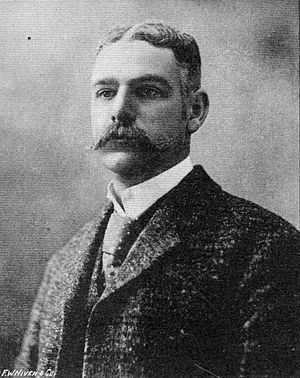History of West Australia/Henry Ernest Parry
HENRY ERNEST PARRY, J.P., M.I.C.E.
CIVIL engineering can reasonably claim to have solved many difficult problems in the physical world. The scope of its research is much wider than the name would lead one to suppose, embracing as it does all the fundamental principles of Natural Philosophy. Its contributions have not been directed to the piling up of a mass of abstract theories to adorn a classic volume, but rather to the interests of humanity by continual improvements and inventions for the expediency of a practical world. It were futile to speak but broadly of the many avenues and channels into which the science of civil engineering runs. The bare mention of railways, bridges, and roads—the most indispensable and useful means for universal transit—will serve to prove the practical importance of the profession. If custom did not blunt sensibility we should look on these as, par excellence, the monuments of skill. Even in this colony, where infancy forbids for obvious reasons the higher results of civil engineering, the foundations on which she rears her superstructures are the legacy and outcome of the bare first principles of this limitless science. Travellers who sit at ease in a luxurious compartment, and think merely of the journey's end might read with profit the lives of those who devise the means to facilitate and render comfortable their passage from one point to the other.
 |
Photo by H.E. PARRY, J.P., M.I.C.E. Greenham & Evans. |
In the development of railway extension, so great a boon in Western Australia, Henry Parry has been an indefatigable worker. He was born in the Island of Barbados, in the West Indies, in 1856. His grandfather was Bishop of that isle for many years, and his father, who was Co-adjutor Bishop of Barbados, and a learned, pious, and distinguished man, came to Perth in 1877, as Bishop of the colony. At the age of ten years Henry left Barbados, and was taken to England. He received a capital mental training. At Clifton, his uncle, St. John Parry (the noted coach), who was undoubtedly one of the great classical grammarians of his time, took him under his careful supervision, and crammed his youthful mind with much scholastic feeding. Here he first revelled in the irregularities of Greek verbs and verse, and heard the pathetic tale of some noble epic. He had been a pupil, too, of Harrison's College in his native island, which boasted a brilliant staff of teachers. Its teacher of mathematics—that science so indispensable to the region of calculation and mensuration—could ably cope with the absent-minded professor in his subject. It is to him that Mr. Parry owes his first love for science, and the material of his valuable teaching is indelibly impressed on his memory. He apprenticed himself in early years to George Bowen, in Huntingdonshire, England, and qualified as a civil engineer within the specified time.
In 1878 Mr. Parry sailed for Western Australia to his new home in Perth. The Government about this time was forced by public needs to extend railway communication in the colony. People coming fresh from the facilities and comforts of the home country grumbled complainingly against tedious and longsome travel by coach. Mr. J. H. Thomas, engineer-in-chief to the Government, appointed Mr. Parry assistant engineer on the new Eastern Railway. In 1880 the trial lines were satisfactorily laid after a year's hard work, and the completion of the work conferred an immense boon on all the colonists, and had the further advantage of opening up and developing these parts of the colony, more especially from an agricultural point of view. From 1881 to 1883 Mr. Parry was locomotive superintendent and resident engineer of the Geraldton and Northampton Railway. At the end of the latter year his services were transferred to the Eastern Railway. He was appointed assistant resident engineer under Mr. Clayton Mason. A more responsible position was soon given to one who had shown himself so capable of filling with the utmost satisfaction all his previous offices. In 1885 he was appointed resident engineer for the Chidlow Wells—Beverley section. In 1886 the Institute of Civil Engineers admitted him as an associate member. During Mr. Parry's career his name has become associated with the construction of many railroads, such as the Clackline and Newcastle line, and the all-important railway from Spencer's Brook to Northam. He superintended, on behalf of the Government, the making of a railroad from Albany to Beverley, a distance of 244 miles, which was looked upon as a gigantic undertaking. With very little assistance he had to survey the mass of the ground through which the proposed railroad was to pass, and to arrange all its measurements. No fault can be found with any part of the work. At present (1896) he is executive engineer of all lines from Perth to Bunbury, and from there to Boyanup and Vasse. He was gazetted a J.P. in 1887.
He has taken an active interest in mining, and made several investments with profitable results. It is impossible for an enthusiastic speculator to be unaffected by mine-epidemic. His engineering talents are to be directed to mining on his own behalf. In 1881 he married the daughter of Sir Malcolm Fraser. In the Masonic Order Mr. Parry is prominent. He was initiated into the mysteries of the craft in 1880, and in the York Lodge held the office of Grand Master for twelve months. He is now a member of the District Grand Lodge.
In 1897 Mr. Parry severed connection with the Government, and now practices on his own behalf.
